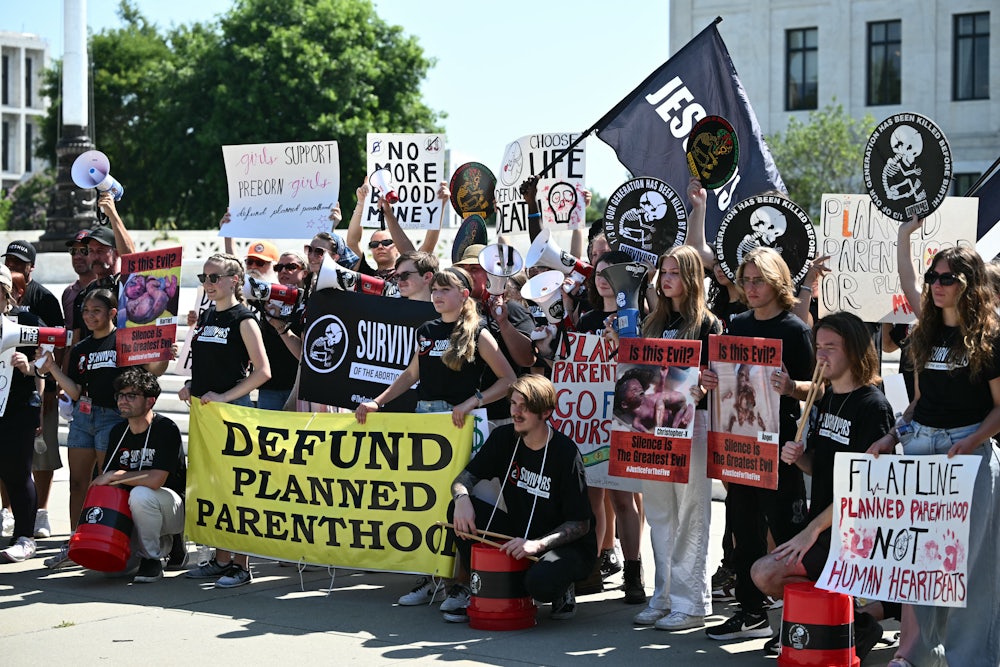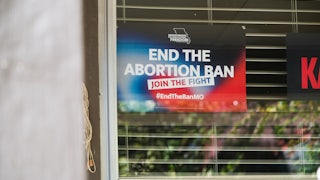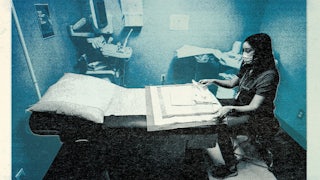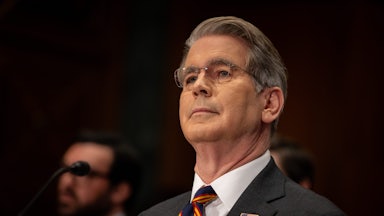Anti-abortion lawmakers and activists did not stop when Roe v. Wade fell. They pressed ahead to ever more violent frontiers. In South Carolina this week, the legislature is considering a bill more extreme than the state’s already extreme abortion ban. The so-called “Unborn Child Protection Act” could be used to prosecute abortion as equivalent to “the homicide of a person who had been born alive.” An earlier version of the act would have made an abortion punishable by life in prison or execution. Despite some anti-abortion activists’ previous claims that they would never support prosecuting people for having an abortion, lawmakers in at least 12 states have now introduced such laws.
Reproductive rights and justice leaders had warned that after Dobbs v. Jackson Women’s Health Organization, the Supreme Court decision that demolished Roe, anti-abortion activists would be emboldened to demand such prosecutions. These warnings were well founded. As new research released Tuesday by the advocacy organization Pregnancy Justice reveals, over the two years following the decision, hundreds of people were prosecuted for their pregnancy outcomes. The group identified more than 400 cases in which prosecutors charged a person for crimes related to their pregnancy, pregnancy loss, or birth. Using media reports, public records, and direct information provided to the group, the report offers a snapshot of who has been charged in this new legal environment. The most common charges, by far, were related to child abuse, neglect, and endangerment. In all, among 412 defendants (some of whom faced multiple charges), 399 charges alleged substance use during pregnancy; 29 alleged lack of prenatal care; and nine allegations involved obtaining, attempting, or researching an abortion. More than half of those charged were white. The vast majority of all charged were low-income.
The report gives some grounding and context to many people’s fears about being punished for their abortions. Even as bans have proliferated, and even as they have certainly contributed to a legal environment in which prosecutions could become more common, the bans are not directly responsible for the hundreds of cases of pregnancy criminalization recorded in this report. All the same, the criminalizations of abortion, miscarriage, and drug use in pregnancy are fundamentally interconnected, as they all involve the criminal legal system’s power to police people for exercising their bodily autonomy. As such, the research is an invitation to consider all of the laws, policies, and policing practices that lead to pregnancy criminalization—and an invitation to resist them as a whole.
One of the most striking aspects of the data is what it shows about where the cases tend to originate. “So many of these cases start by a health care provider,” Pregnancy Justice senior vice president Dana Sussman told me this week. That provider may think they’re required to report a pregnant person “to either a child welfare agency or the police, or both.” Pregnant patients encounter doctors, nurses, physician’s assistants, and social workers who have been primed to report them, or who may believe they have less discretion about what they say than they really do. “It’s such a normalized process,” Sussman added. “People are being reported, and then they’re being swept up into the system.” The reports could be for anything that has been deemed “suspicious,” Sussman said, from showing a positive drug test to not having had prenatal care, to displaying a flat affect. While some hospitals have changed their approach to mandatory drug testing, those changes don’t address other ways pregnant people are profiled and reported to state agencies and law enforcement.
Pregnancy Justice’s prior research into pregnancy criminalization since 1973, when Roe was decided, made this report’s findings unsurprising to the group. “The foundation for all of this was laid in the ’80s and ’90s,” Sussman explained, “around the moral panic associated with the ‘crack baby’ epidemic.” At that time, almost exclusively Black women were charged, under the presumption that any drug use during pregnancy constituted child endangerment. Hospitals and clinics became outposts in the war on drugs. Testing patients seeking prenatal care for drugs became routine for those who were profiled as drug users or were on Medicaid. Health care workers were drafted as mandatory reporters, treating positive test results as indicators of child abuse or neglect to be reported to state agencies.
As the war on drugs shifted to target opioid users, Pregnancy Justice saw that in the cases it tracked, white people became the majority among those charged in pregnancy criminalization cases. This pattern was already shifting before Dobbs. In the cases in the two years since, 61 charges involved allegations of fentanyl use, and 44 involved allegations of cocaine or crack use. There were also 22 cases involving medication-assisted treatment, such as buprenorphine, suggesting that some of those charged were at the time trying to stop or reduce their drug use. This is worth highlighting not because these cases were somehow less deserving of punishment but rather as an illustration of how wide the web of pregnancy criminalization stretches.
Anti-abortion groups have justified the widening web by invoking the need to protect “unborn children.” They have sought to change the law so that an embryo or fetus is granted the same rights as a legal person, opening the way for people to be criminalized for their pregnancies. Pushing pregnancy policing and “fetal personhood” has helped the anti-abortion movement, even when it was not scoring wins in the state legislatures or at the Supreme Court, to entrench its worldview among law enforcement and the general public. But while the movement may be savvy, that’s not the only reason its strategies have been successful. Policing pregnant people in the name of “child” protection fits in well with existing stigma about drugs and racialized tropes about who makes a good mother. Pregnancy criminalization, in truth, involves protecting a particular subset of pregnancies and policing a particular subset of parents.
Claims of “child protection” also allow police and prosecutors to harness existing laws to police pregnancy. This is how hundreds of people were prosecuted for the outcome of their pregnancies in the two years following the Dobbs decision. In fact, to charge people for their abortions, states don’t actually need laws such as the one up for debate in South Carolina. “If prosecutors adopt this ideology around fetal personhood,” said Sussman of Pregnancy Justice, “it really doesn’t matter if there’s a criminal abortion law on the books or not that targets pregnant people.” In other words, if a prosecutor wants to charge someone with a crime for a suspected abortion, they can just try to use a child endangerment law that already exists—and that’s exactly what’s happening.
Pregnancy criminalization is not a new problem, then—but could the post-Roe momentum do anything to address it? While mainstream reproductive rights efforts appear focused for now on ballot measures, working to add a right to abortion and all forms of reproductive health care to state constitutions, those campaigns do not directly address the ways people are criminalized for their abortions or other pregnancy outcomes. They don’t address the myriad other laws that can be used, such as Nevada’s 1911 law barring the use of drugs or other substances to terminate a pregnancy, under which a woman was charged in 2018 after a stillbirth. They don’t address states where pregnant people are immune to prosecution but where, as in Georgia in 2015, one woman was arrested while in a hospital bed after seeking care for a miscarriage and charged with “malice murder,” and her children were taken into custody. Nearly a decade later, that pattern continues, with health care workers serving as the entry point into the criminal legal system.
“Dismantling the mandatory-reporting pipeline in hospital settings,” as Dana Sussman told me, is critical to ending pregnancy criminalization. In a way, Dobbs brought more recognition to the risk of pregnancy criminalization, particularly for abortion funds, people self-managing an abortion, and people helping others obtain an abortion. Connecting all of this is the reasonable concern, after Dobbs, that any pregnancy could be considered a potential crime scene, depending on the word of a nurse or a child welfare worker, or a prosecutor’s discretion, no matter what laws are in effect. Refusing to be criminalized is not about claiming one’s own individual innocence; rather, it requires affirming that none of this should be considered a crime in the first place.






